August 2022
The Relationship Between Gout and Alcohol
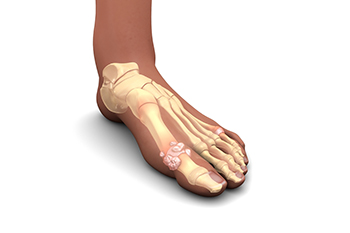
Gout is one of the many conditions that impacts the joints of the body. Specifically, when there is an excess of uric acid in the body, gout occurs commonly in the joint of the big toe. If an individual has gout, they may feel intense pain in the joints during what is known as “gout attacks.” Swelling and sensations of warmness may occur. Gout has an interesting relationship with alcohol that anyone who is serious about maintaining the health of their feet ought to be aware of. Consuming large quantities of alcohol can increase the risk of developing or aggravating gout in some individuals. This is because alcohol is a substance that contains many purines, and when the human body processes purines, uric acid is ultimately released. Uric acid, of course, causes gout. It is important to note that consuming beer, as opposed to hard liquor, makes one more susceptible to increasing the risk of developing gout. Additionally, men can be even more prone to developing gout from alcohol than women. If you are drinking more than twelve drinks of alcohol in any given week, then you may be putting yourself at risk of a gout attack in your feet. You might want to contact a podiatrist who will be able to help you treat or mitigate any problems related to gout.
Gout is a foot condition that requires certain treatment and care. If you are seeking treatment, contact one of our podiatrists from Bazzi Podiatry. Our doctors will treat your foot and ankle needs.
What Is Gout?
Gout is a type of arthritis caused by a buildup of uric acid in the bloodstream. It often develops in the foot, especially the big toe area, although it can manifest in other parts of the body as well. Gout can make walking and standing very painful and is especially common in diabetics and the obese.
People typically get gout because of a poor diet. Genetic predisposition is also a factor. The children of parents who have had gout frequently have a chance of developing it themselves.
Gout can easily be identified by redness and inflammation of the big toe and the surrounding areas of the foot. Other symptoms include extreme fatigue, joint pain, and running high fevers. Sometimes corticosteroid drugs can be prescribed to treat gout, but the best way to combat this disease is to get more exercise and eat a better diet.
If you have any questions please feel free to contact one of our offices located in Detroit, West Detroit, Northwest Detroit, Sterling Heights, Hamtramck, Dearborn Heights, Madison Heights, Redford, and Livonia, MI . We offer the newest diagnostic and treatment technologies for all your foot and ankle needs.
Getting to the Root of Heel Pain
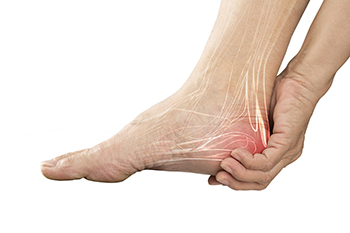
Heel pain can be caused by a variety of conditions. Plantar fasciitis is an overuse injury and the leading cause of heel pain. This is where the plantar fascia tissue on the bottom of the foot—which connects the heel bone with the toes—is overly stressed or torn, and becomes inflamed. Stress on the heel bone, caused by plantar fasciitis, can also trigger a reactionary response in the body where calcium deposits (heel spurs) build up on the heel bone over time. However, heel spurs are not always symptomatic. If a growing child experiences heel pain, they may have Sever’s disease, an inflammation of the growth plate at the back of the heel. Another type of heel pain can be caused by irritation and inflammation of the fluid-filled sac (bursa) at the back of the ankle where the heel connects with the Achilles tendon. This is known as bursitis. Heel pain can also be caused by a nerve leading to the heel that becomes compressed, bumps and bruises, and even systemic diseases like gout and arthritis. If you are experiencing any kind of heel pain, have your condition properly diagnosed and treated by a podiatrist.
Many people suffer from bouts of heel pain. For more information, contact one of our podiatrists of Bazzi Podiatry. Our doctors can provide the care you need to keep you pain-free and on your feet.
Causes of Heel Pain
Heel pain is often associated with plantar fasciitis. The plantar fascia is a band of tissues that extends along the bottom of the foot. A rip or tear in this ligament can cause inflammation of the tissue.
Achilles tendonitis is another cause of heel pain. Inflammation of the Achilles tendon will cause pain from fractures and muscle tearing. Lack of flexibility is also another symptom.
Heel spurs are another cause of pain. When the tissues of the plantar fascia undergo a great deal of stress, it can lead to ligament separation from the heel bone, causing heel spurs.
Why Might Heel Pain Occur?
- Wearing ill-fitting shoes
- Wearing non-supportive shoes
- Weight change
- Excessive running
Treatments
Heel pain should be treated as soon as possible for immediate results. Keeping your feet in a stress-free environment will help. If you suffer from Achilles tendonitis or plantar fasciitis, applying ice will reduce the swelling. Stretching before an exercise like running will help the muscles. Using all these tips will help make heel pain a condition of the past.
If you have any questions please contact one of our offices located in Detroit, West Detroit, Northwest Detroit, Sterling Heights, Hamtramck, Dearborn Heights, Madison Heights, Redford, and Livonia, MI . We offer the newest diagnostic and treatment technologies for all your foot and ankle needs.
Pain Around the Toenails
Although they m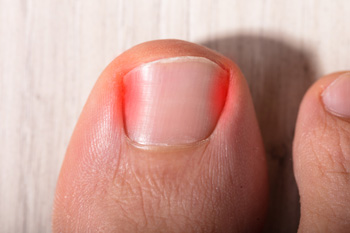 ake up relatively small areas of the toes, toenails are critical components of your feet. Therefore, when you are experiencing toenail pain, you should not ignore it. There are a variety of different potential causes to keep in mind that might be affecting your toenails. First, you might have experienced some kind of toenail trauma, from injuring the toenail, stubbing it, or cramming it into ill-fitting footwear. The trauma might cause the toenail to bruise underneath, which might feel painful. You may feel a sensation of pressure at the affected toenail. Second, your toenail pain might be caused by an ingrown toenail. This kind of condition occurs when the side of the toenail essentially grows into the skin surrounding the nail. It can occur if the nail is abnormally shaped, making it easy for the skin to grow on top of the nail. Third, your toenail pain might be a result of some kind of fungal infection, such as athlete’s foot. Fungal infections at or around the toenails can cause redness, a splitting in the nail, and significant pain. These are only some of the potential causes of your toenail pain. If you are experiencing toenail pain, consider contacting a podiatrist who can help you identify and address the problem.
ake up relatively small areas of the toes, toenails are critical components of your feet. Therefore, when you are experiencing toenail pain, you should not ignore it. There are a variety of different potential causes to keep in mind that might be affecting your toenails. First, you might have experienced some kind of toenail trauma, from injuring the toenail, stubbing it, or cramming it into ill-fitting footwear. The trauma might cause the toenail to bruise underneath, which might feel painful. You may feel a sensation of pressure at the affected toenail. Second, your toenail pain might be caused by an ingrown toenail. This kind of condition occurs when the side of the toenail essentially grows into the skin surrounding the nail. It can occur if the nail is abnormally shaped, making it easy for the skin to grow on top of the nail. Third, your toenail pain might be a result of some kind of fungal infection, such as athlete’s foot. Fungal infections at or around the toenails can cause redness, a splitting in the nail, and significant pain. These are only some of the potential causes of your toenail pain. If you are experiencing toenail pain, consider contacting a podiatrist who can help you identify and address the problem.
Toe pain can disrupt your daily activities. If you have any concerns, contact one of our podiatrists of Bazzi Podiatry. Our doctors can provide the care you need to keep you pain-free and on your feet.
What Causes Toe Pain?
Most severe toe pain is caused due to a sports injury, trauma from dropping something heavy on the toe, or bumping into something rigid. Other problems can develop over time for various reasons.
Toe pain can be caused by one or more ailments. The most common include:
- Trauma
- Sports injury
- Wearing shoes that are too tight
- Arthritis
- Gout
- Corns and calluses
- Hammertoe
- Bunions
- Blisters
- Ingrown toenails
- Sprains
- Fractures (broken bones)
- Dislocations
When to See a Podiatrist
- Severe pain
- Persistent pain that lasts more than a week
- Signs of infection
- Continued swelling
- Pain that prevents walking
Diagnosis
In many cases the cause of toe pain is obvious, but in others, a podiatrist may want to use more advanced methods to determine the problem. These can range from simple visual inspections and sensation tests to X-rays and MRI scans. Prior medical history, family medical history, and any recent physical traumatic events will all be taken into consideration for a proper diagnosis.
Treatment
Treatments for toe pain and injuries vary and may include shoe inserts, padding, taping, medicines, injections, and in some cases, surgery. If you believe that you have broken a toe, please see a podiatrist as soon as possible.
If you have any questions please feel free to contact one of our offices located in Detroit, West Detroit, Northwest Detroit, Sterling Heights, Hamtramck, Dearborn Heights, Madison Heights, Redford, and Livonia, MI . We offer the newest diagnostic tools and technology to treat your foot and ankle needs.
Peripheral Neuropathy and the Feet
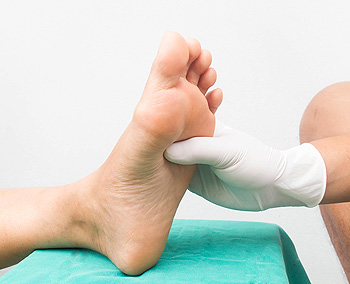
Peripheral neuropathy is a condition that primarily affects the nerves of the body by making you feel abnormal sensations or fail to feel sensations that you should be feeling. This condition can affect nerves throughout the body, but it can also affect the feet, which can be particularly uncomfortable. The nerve damage in the feet can make you feel a variety of symptoms. These symptoms might include a feeling of numbness in the feet, a “pins and needles” feeling, periodic shooting pains, and difficulty balancing on your feet, among many other things. Importantly, if you have neuropathy in your feet, it can be a good idea to take extra precautions for your feet. For example, check them regularly to ensure that they have not gotten an injury that you did not notice or feel. Also, you might consider being extra diligent about keeping them warm and well-covered during colder winter months, as neuropathy can interfere with the feet’s sensitivity to cold weather. If you or a loved one suffer from neuropathy in the feet, contact a podiatrist.
Neuropathy
Neuropathy can be a potentially serious condition, especially if it is left undiagnosed. If you have any concerns that you may be experiencing nerve loss in your feet, consult with one of our podiatrists from Bazzi Podiatry. Our doctors will assess your condition and provide you with quality foot and ankle treatment for neuropathy.
What Is Neuropathy?
Neuropathy is a condition that leads to damage to the nerves in the body. Peripheral neuropathy, or neuropathy that affects your peripheral nervous system, usually occurs in the feet. Neuropathy can be triggered by a number of different causes. Such causes include diabetes, infections, cancers, disorders, and toxic substances.
Symptoms of Neuropathy Include:
- Numbness
- Sensation loss
- Prickling and tingling sensations
- Throbbing, freezing, burning pains
- Muscle weakness
Those with diabetes are at serious risk due to being unable to feel an ulcer on their feet. Diabetics usually also suffer from poor blood circulation. This can lead to the wound not healing, infections occurring, and the limb may have to be amputated.
Treatment
To treat neuropathy in the foot, podiatrists will first diagnose the cause of the neuropathy. Figuring out the underlying cause of the neuropathy will allow the podiatrist to prescribe the best treatment, whether it be caused by diabetes, toxic substance exposure, infection, etc. If the nerve has not died, then it’s possible that sensation may be able to return to the foot.
Pain medication may be issued for pain. Electrical nerve stimulation can be used to stimulate nerves. If the neuropathy is caused from pressure on the nerves, then surgery may be necessary.
If you have any questions, please feel free to contact one of our offices located in Detroit, West Detroit, Northwest Detroit, Sterling Heights, Hamtramck, Dearborn Heights, Madison Heights, Redford, and Livonia, MI . We offer the newest diagnostic and treatment technologies for all your foot care needs.
Plantar Warts Can Be Treated!
Keeping Senior Feet Healthy
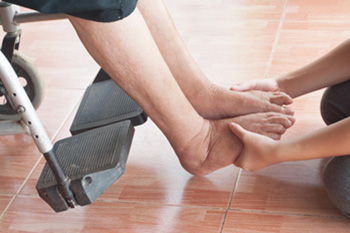
Healthy feet allow seniors to stay mobile and remain active and independent. Proper foot care is recommended for a lifetime but more importantly as one ages, as seniors are more prone to medical conditions and foot problems. For example, many seniors have diabetes and can be susceptible to nerve damage, infections, and poor circulation in their feet. Similarly, many in this age group suffer from some form of arthritis that causes foot pain. Daily foot care that will maintain the health of one’s feet include washing, drying, and moisturizing feet daily, and checking feet for cuts, blisters, or any problems that could lead to infection. Cutting toenails regularly and straight across to prevent ingrown toenails, wearing properly fitted footwear and soft cotton or wool socks to protect and cushion the feet, and staying active to maintain circulation in the legs and feet will also help. A podiatrist is a good medical professional to include on your healthcare team if you are a senior or providing care for the aged. Such a doctor can help in maintaining foot health, identify sources of foot discomfort, and suggest treatment options.
If you need your feet checked, contact one of our podiatrists of Bazzi Podiatry. Our doctors will attend to all of your foot and ankle needs and provide you with quality treatment.
Geriatrics and Podiatry
When people age, some common issues that may occur are bone density loss, dry skin, poor circulation, and rough brittle nails. These issues may also affect your foot health if the necessary steps are not taken to alleviate the problems.
It is important to take care of your feet because feet that are injured or diseased can affect your overall health. Having painful feet hinders your ability to do daily activities or may decrease your willingness to do the things that you need to do.
Visiting Your Geriatrician
As we age, health problems become more likely, so it is essential to visit your doctor for check-ups to ensure that you are doing the best you can to take care of your health. It is recommended to check your feet frequently for any possible cuts, bruises, swelling, corns or any other irregularities.
Taking Care of Elderly Feet
Cracked or dry feet can be treated by applying moisturizer often. It is also important not to wear old socks because the older the sock is, the higher the possibility there will be that there is bacteria there. Wear fresh socks and make sure they fit properly.
Proper foot health means that you can have a more active lifestyle and you will not be bogged down by pain. Foot health also leads to good circulation, which is paramount for overall health.
If you have any questions, please feel free to contact one of our offices located in Detroit, West Detroit, Northwest Detroit, Sterling Heights, Hamtramck, Dearborn Heights, Madison Heights, Redford, and Livonia, MI . We offer the newest diagnostic tools and technology to treat your foot and ankle needs.





